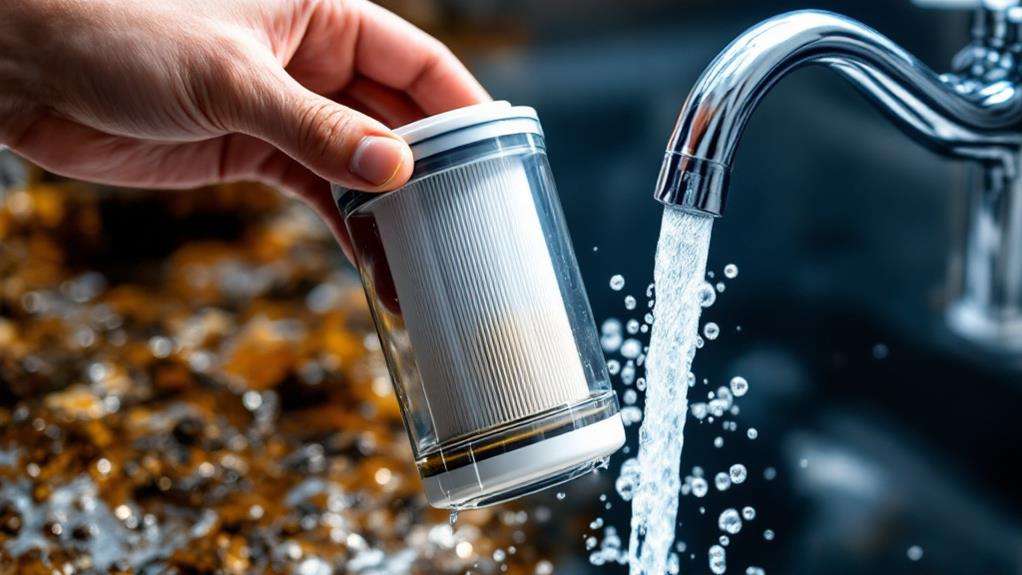Water Filtration for Well Water: Essential Tips for Cleaner Water
To guarantee cleaner well water, start by understanding your water's unique characteristics through regular testing. Choose a filtration system that addresses specific contaminants in your well, such as sediment filters, carbon filters, or UV light systems. Consider whole-house filters for comprehensive protection or point-of-use options for targeted treatment. Maintain your system diligently, replacing filters and inspecting components as recommended. Don't forget to test your water annually and stay informed about potential environmental issues affecting your area. By implementing these essential tips, you'll safeguard your family's health and enjoy cleaner, safer well water. Explore more ways to optimize your well water quality below.
Understanding Well Water Basics
When it comes to well water, understanding the fundamentals is essential for guaranteeing your home's water safety. Unlike municipal water, your well water isn't regulated or tested by outside authorities, making it your responsibility to maintain its quality. Your well taps into groundwater, providing an independent water source that can be vulnerable to various contaminants.
To keep your well water safe, you'll need to be proactive. Regular water tests are indispensable to identify potential issues like bacteria, nitrates, and heavy metals. The depth and construction of your well play a significant role in water quality, with deeper wells generally offering better protection against contamination.
To Filter well water effectively, you'll need to understand your specific water composition. Contact us for professional water tests to determine the best filtration system for your needs. Remember, your private well requires ongoing attention to maintain ideal water quality. By staying informed and implementing the right filter, you can ensure that your water is filtered properly, providing clean and safe water for your household.
Common Well Water Contaminants
Now that you're familiar with well water basics, let's investigate the common contaminants you might encounter. Well water can contain a variety of naturally occurring substances that pose health risks if not properly filtered. These include arsenic, radon, and heavy metals, which can be effectively removed with advanced water filtration systems like reverse osmosis.
Microbial contaminants are another concern for private wells. Coliform bacteria and E. coli can enter your water supply, causing gastrointestinal illness. UV light treatment is an effective method to neutralize these harmful microorganisms.
If you're dealing with hard water, you'll notice scale buildup and potential damage to appliances and plumbing. A water softener can help address high mineral content, improving water quality and extending the life of your fixtures.
Nitrates from agricultural runoff or faulty septic systems can contaminate well water, posing dangers especially for infants. Additionally, volatile organic compounds, pesticides, and industrial chemicals may find their way into your water supply. Regular testing and appropriate filtration techniques are essential to guarantee your well water remains safe and clean for consumption and everyday use.
Importance of Regular Testing

Regular testing is the cornerstone of maintaining safe well water. As a private well owner, you're responsible for ensuring your water quality remains high. Don't underestimate the importance of annual comprehensive testing, especially in spring. Your well water can change over time due to various factors, including new contamination sources or well damage.
To safeguard your household's health, you should test for a range of contaminants. Focus on coliform bacteria, E. coli, radon, arsenic, and minerals. These tests will help you identify potential risks and take appropriate action. Remember, neglecting regular water testing puts your family at risk, particularly those who are more sensitive to contaminants.
Water quality isn't static, so staying vigilant is vital. Consider consulting a water expert to guide you through the testing process and interpret results. They can also advise on any necessary treatments or filtration systems. Keep an eye on your septic system, as it can impact your well water quality. By prioritizing regular testing, you're taking an essential step towards ensuring your well water remains safe and clean for years to come.
Choosing the Right Filtration System
After identifying potential contaminants through regular testing, you'll need to select an appropriate filtration system for your well water. Different water filter systems target specific common contaminants, so it's vital to choose one that addresses your well water's unique needs.
Consider these well water filtration options:
- Sediment filters: Remove particles through fine plastic pores
- Carbon filters: Absorb chemical contaminants
- Reverse osmosis systems: Force water through a membrane, removing most contaminants
- UV light filters: Kill microorganisms and bacteria
- Water distillers: Boil and condense water, but impractical for large volumes
For all-encompassing well water treatment, you might need to combine multiple systems. For instance, you could use a sediment filter to remove particles, followed by a carbon filter for chemicals, and finally a UV light filter to eliminate bacteria. If your well water contains a wide range of contaminants, a reverse osmosis system might be your best option. It's effective against most pollutants, though it may require pre-filtration for optimal performance. Remember, no single system addresses all water quality issues, so tailor your choice to your specific well water concerns.
UV Light Filtration Benefits

UV light filtration offers a powerful and chemical-free solution for well water disinfection. By harnessing the power of UV rays, these water filter systems can eliminate up to 99.99% of harmful microorganisms, ensuring your drinking water is safe and clean. Unlike other types of filters that rely on chemicals, UV light filtration provides consistent protection 24/7 without altering your water's taste or odor.
To maintain the effectiveness of your UV light filtration system, you'll need to replace the UV bulbs every 9-12 months. This regular maintenance, along with checking for leaks and making timely repairs, is essential for ensuring your water remains safe to drink. It's also important to conduct regular water testing to monitor the quality of your well water and adjust your filtration system accordingly.
For optimal performance, you may need to combine UV light filtration with other types of filters, depending on your well water's specific contaminants. By investing in an extensive water filter system that includes UV light technology, you're taking a significant step towards Environmental Protection and safeguarding your family's health through cleaner, safer drinking water.
Whole-House vs. Point-of-Use Filters
When considering water filtration options for your well water, you'll need to decide between whole-house and point-of-use filters. Whole-house filters are installed on the main water line, purifying all water entering your home. They're more thorough, capable of removing a wide range of water contaminants like lead, arsenic, and heavy metals. Point-of-use filters, on the other hand, treat water at specific faucets or appliances, focusing on issues like taste and odor.
Whole-house water filtration systems typically have a higher upfront cost but require less frequent maintenance compared to multiple point-of-use filters. Point-of-use filters are more convenient for addressing localized water quality problems and can be easily replaced, but they don't protect your entire water supply.
When choosing between these water treatment options, consider:
- Specific contaminants present in your well water
- Desired level of water quality improvement
- Your budget for upfront costs and ongoing maintenance
- Need for thorough protection vs. targeted treatment
- Personal preferences for water taste and odor
Your decision will depend on these factors, ensuring you select the most suitable water filtration system for your home's needs.
Maintaining Your Filtration System

Proper maintenance of your water filtration system is essential for preserving its longevity and effectiveness. To keep your well water filtration systems running smoothly, you'll need to take care of a few key tasks regularly.
First, make sure you're changing your filters as recommended by the manufacturer. Different types of filters have varying lifespans, so pay attention to the specific requirements for your system. It's also vital to have your water tested periodically to guarantee your filter for well water is still effectively removing contaminants.
Regularly inspect your system for any signs of wear or damage. Look for leaks, cracks, or unusual noises that might indicate a problem. If you notice anything out of the ordinary, address it promptly to prevent more significant issues down the line.
Don't forget to clean your system's components as needed. This may include sanitizing storage tanks or flushing out sediment buildup. By staying on top of these maintenance tasks, you'll keep your water safe and your filtration system running efficiently for years to come.
Cost Considerations for Well Filtration
Investing in a vital water filtration system is a central decision that requires careful consideration of various cost factors. When it comes to well water, you'll need to weigh the options between whole-house systems and point-of-use filters. Whole-house water filtration systems can range from $500 to $5,000, depending on your home's size and specific filtration needs. Installation costs typically add another $200 to $500, with ongoing maintenance and replacement filter expenses averaging $50 to $200 annually.
For a more budget-friendly option, consider under-sink point-of-use filters, which cost $100 to $500 upfront, plus $50 to $100 yearly for replacements. To determine the most cost-effective solution for your well water quality, consider these factors:
- Water hardness levels
- Types of contaminants present
- Required flow rate
- Size of your household
- Long-term maintenance costs
Consulting a water treatment professional can help you assess your specific needs and choose the most appropriate filtration system. Remember, while upfront costs may seem high, investing in quality water filtration can lead to improved water quality and potentially save you money on appliance repairs and health-related expenses in the long run.
Ensuring Long-Term Water Safety

Having addressed the financial aspects of well water filtration, it's time to focus on maintaining clean water for years to come. To guarantee safe drinking water, you'll need to establish a routine for monitoring and maintaining your well system. Start by having your well tested annually for contaminants and dissolved solids. This practice is essential in the United States, where water problems can vary greatly by region.
Regularly inspect your well cap and casing for signs of damage or wear. Replace your water filters according to the manufacturer's recommendations to maintain ideal performance. Consider installing a water quality monitoring system to alert you of any sudden changes in your water's composition.
Educate yourself about potential contaminants in your area and stay informed about local environmental issues that could affect your well. Be proactive in addressing any concerns – don't wait for problems to escalate. Remember, Best Water practices involve ongoing vigilance and maintenance. By taking these steps, you'll safeguard your Home Water supply and ensure your family has access to safe, clean water for years to come.

